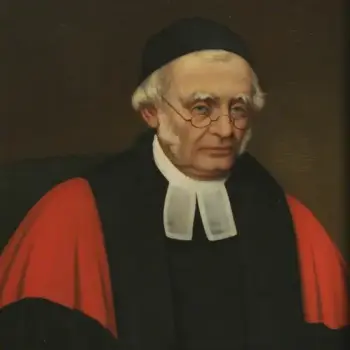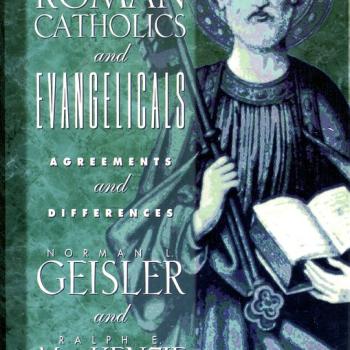
Yours truly, in my Protestant evangelical days: February 1984, doing my “Bob Dylan” routine . . .
*****
(9-4-03; rev. 10-9-03 and 1-5-05; abridged on 11-14-16)
*****
Vatican II is binding on all Catholics. Here is what Vatican II says (note how Protestants — and Orthodox — are repeatedly referred to as “Christians” and part of the Body of Christ):
The restoration of unity among all Christians is one of the principal concerns of the Second Vatican Council. (1; beginning of document)
many Christian communions (1)
divided Christians (1)
among our separated brethren also there increases from day to day a movement, fostered by the grace of the Holy Spirit, for the restoration of unity among all Christians. Taking part in this movement, which is called ecumenical, are those who invoke the Triune God and confess Jesus as Lord and Saviour. They do this not only as individuals but also as members of corporate groups in which they have heard the Gospel . . . The sacred Council gladly notes all this (1)
restoration of unity among all the followers of Christ. (1)
. . . in subsequent centuries much more serious dissensions appeared . . . for which, often enough, men of BOTH SIDES were to blame. However, one CANNOT CHARGE WITH THE SIN OF SEPARATION those who at present are born into these communities and in them are brought up in the faith of Christ, and the Catholic Church accepts them with RESPECT and AFFECTION as BROTHERS. For men who believe in Christ and have been properly baptized are put in some, though imperfect, communion with the Catholic Church. (3)
all who have been justified by faith in baptism are INCORPORATED INTO CHRIST [footnote cites Council of Florence, Session 8, from the year 1439]; they therefore have a right to be called CHRISTIANS, and with good reason are accepted as BROTHERS by the children of the Catholic Church. (3)
Moreover, some, even very many, of the most significant elements and endowments which together go to build up and give life to the Church itself, can exist OUTSIDE the visible boundaries of the Catholic Church: the written Word of God; the life of grace; faith, hope and charity, with the other interior gifts of the Holy Spirit, as well as visible elements. ALL of these . . . COME FROM CHRIST and lead back to him . . . (3)
The brethren divided from us also carry out many liturgical actions of the Christian religion. In ways that vary according to the conditions of each Church or community, these liturgical actions most certainly can truly engender a LIFE OF GRACE, and, one must say, can aptly GIVE ACCESS TO THE COMMUNION OF SALVATION. (3)
the separated Churches and communions as such . . . have been by no means deprived of significance and IMPORTANCE IN THE MYSTERY OF SALVATION. For the Spirit of Christ has not refrained from using them as a MEANS OF SALVATION which derive their efficacy from the very fullness of grace and truth entrusted to the Catholic Church. (3)
The sacred Council exhorts, therefore, all the Catholic faithful to recognize the signs of the times and take an active and intelligent part in the work of ecumenism. (4)
. . . every effort to avoid expressions, judgments, and actions which do not represent the condition of our separated brethren with truth and fairness and so make mutual relations with them more difficult . . . Through such dialogue everyone gains a truer knowledge and more just appreciation of the teaching and religious life of both communions. (4)
Catholics must gladly acknowledge and esteem the TRULY CHRISTIAN ENDOWMENTS for our common heritage which are to be found among our separated brethren. It is right and salutary to recognize the RICHES OF CHRIST and virtuous works in the lives of others who are BEARING WITNESS TO CHRIST, sometimes even to the shedding of their blood. (4)
Nor should we forget that anything WROUGHT BY THE GRACE OF THE HOLY SPIRIT in the hearts of our separated brethren can CONTRIBUTE TO OUR OWN EDIFICATION. Whatever is TRULY CHRISTIAN is never contrary to what GENUINELY BELONGS TO THE FAITH; indeed, it can always bring a more perfect realization of the very mystery of Christ and the Church. (4)
bond of brotherhood existing among all Christians. (5)
There can be no ecumenism worthy of the name without interior conversion . . . We should therefore pray to the Holy Spirit for the grace to be genuinely self-denying, humble, gentle in the service of others and to have an attitude of brotherly generosity toward them . . . The faithful should remember that they promote union among Christians better, that indeed they live it better, when they try to lead holier lives according to the Gospel. For the closer their union with the Father, the Word, and the Spirit. the more deeply and easily will they be able to grow in mutual brotherly love. This change of heart and holiness of life, along with public and private prayer for the unity of Christians, should be regarded as the soul of the whole ecumenical movement . . . (7-8)
restoration of unity among Christians (8)
We must become familiar with the outlook of our separated brethren. Study is absolutely required for this, and it should be pursued in fidelity to the truth and with a spirit of good will . . . Most valuable for this purpose are meetings of the two sides — especially for discussion of theological problems — where each can treat with the other on an equal footing, provided that those who take part in them under the guidance of the authorities are truly competent . . . In this way, too, we will better understand the outlook of our separated brethren and more aptly present our own belief. (9)
Catholic belief must be explained more profoundly and precisely, in such a way and in such terms that our separated brethren can also really understand it. (11)
Before the whole world let all Christians confess their faith in one God, one and three, in the incarnate Son of God, our Redeemer and Lord. United in their efforts, and with mutual respect, let them bear witness to our common hope . . . (12)
. . . all Christians, since they bear the seal of Christ’s name. Cooperation among Christians vividly expresses that bond which already unites them . . . Through such cooperation, all believers in Christ are able to learn easily how they can understand each other better and esteem each other more, and how the road to the unity of Christians may be made smooth. (12)
we rejoice that our separated brethren look to Christ as the source and center of ecclesiastical communion. Their longing for union with Christ impels them ever more to seek unity, and also to bear witness to their faith among the peoples of the earth. (20)
A love and reverence . . . of Holy Scripture leads our brethren to a constant and diligent study of the sacred text . . . in the dialogue itself, the sacred word is a precious instrument in the mighty hand of God for attaining to that unity which the Saviour holds out to all men. (21)
By the sacrament of Baptism . . . man becomes truly incorporated into the crucified and glorified Christ and is reborn to a sharing of the divine life [cites Romans 6:4] . . . Baptism, therefore, constitutes the sacramental bond of unity existing among all who through it are reborn. (22)
The Christian way of life of these brethren is nourished by faith in Christ. It is strengthened by the grace of baptism and the hearing of the Word of God. This way of life expresses itself in private prayer, in meditation on the scriptures, in the life of a Christian family, and in the worship of a community gathered together to praise God. Furthermore, their worship sometimes displays notable features of a liturgy once shared in common. The faith by which they believe in Christ bears fruit in praise and thanksgiving for the benefits received from the hands of God. Joined to it is a lively sense of justice and a true charity toward others. This active faith has been responsible for many organizations for the relief of spiritual and material distress, the furtherance of education of youth, the improvement of social conditions of life, and the promotion of peace throughout the world. (23)
No one can argue from these words above (binding on all Catholics) that, somehow, Catholics are questioning the salvation of Protestants in sweeping terms, or that we think they “cannot be Christian.” Any Catholic who is “anti-Protestant,” believes that expressly against the injunctions of Vatican II. Recent encyclicals by Pope St. John Paul II are even more ecumenical than Vatican II. The term “separated brethren” used of Protestants, means that we are separated institutionally, just as Protestants are amongst themselves.
Thus, we don’t hold that Protestants are “separated from the Body of Christ.” Quite the contrary. They are “truly incorporated into the crucified and glorified Christ.” Vatican II repeatedly refers to Protestants as “Christians” and as “incorporated into Christ” (hard to do that and not be part of His Body). The Council gladly acknowledges that Protestants have a “LIFE OF GRACE,” and that Protestant communions “can aptly GIVE ACCESS TO THE COMMUNION OF SALVATION” and “have been by no means deprived of significance and IMPORTANCE IN THE MYSTERY OF SALVATION.” Here are other terms applied to Protestants . . . :
“TRULY CHRISTIAN ENDOWMENTS”
“RICHES OF CHRIST and virtuous works in the lives of others who are BEARING WITNESS TO CHRIST”
“. . . WROUGHT BY THE GRACE OF THE HOLY SPIRIT in the hearts of our separated brethren can CONTRIBUTE TO OUR OWN EDIFICATION. Whatever is TRULY CHRISTIAN is never contrary to what GENUINELY BELONGS TO THE FAITH.”
What more does one need? We are ecumenical, because Scripture gives great emphasis to unity and the bond of doctrine held in common and the seal of baptism.
I can easily show how people not formally part of the institutional religion of the time, or Christians at all, possessed grace and might be saved by Christ. The Roman centurion whom Jesus met (Matthew 8:5-13) — the guy who asked if He would heal his servant — was not a Christian at all (thus this is a much more “extreme” scenario than Protestants and Catholics, who are both Christians). Yet Jesus said of him, “Not even in Israel have I found such faith” (8:10) Then He went on to explain how many Jews would be damned (8:12) but Gentiles (like, by clear implication, the centurion himself) would “sit at table with Abraham, Isaac, and Jacob in the kingdom of heaven” (8:11).
The thief on the cross is another example. As far as we know, Jesus didn’t present the gospel to him (though He may have). But that man was saved. See also the related passage, Romans 2:12-16, about “outsiders” being saved. We believe Protestants are indeed “in Christ” by virtue (most specifically) of baptism, and in imperfect communion with the Catholic Church, not “cut off” from either it or the “Body of Christ.” Institutionally and doctrinally, we believe that the Catholic Church was founded by our Lord Jesus Christ in His commission to Peter, the Rock (that is, the human leader) upon which He built His Church, and that it has maintained the fullness of the apostolic teaching or deposit from that time till now.
However, we also hold to a notion of the Mystical Body of Christ, and this includes Protestants, who are part of the Body through baptism. It’s not “either/or.” It is “both/and.” The Church is called the Body of Christ in Scripture. But we say that the Church has one doctrine, not many. So obviously we believe the Catholic Church to be the Guardian of that one doctrine. Many Protestants have an “invisible church” ecclesiology, which is another discussion (and really underneath the present one, in the unspoken presuppositions of many Protestants).
In the Catechism of the Catholic Church, we see this thought clearly taught. It includes the section II. The Church – Body of Christ (before #787). In that section, we find explicit teaching that Protestants are part of the Body of Christ:
Believers who respond to God’s word and become members of Christ’s Body, become intimately united with him: “In that body the life of Christ is communicated to those who believe, and who, through the sacraments, are united in a hidden and real way to Christ in his Passion and glorification” [citation of Vatican II, Lumen Gentium, 7], This is especially true of Baptism, which unites us to Christ’s death and Resurrection . . . (#790; p. 209)
Catholics believe that Protestant trinitarian baptism offers the same exact benefits of grace as Catholic baptism. That is why, if it can be shown that one was validly baptized as a Protestant, they do not need to be re-baptized upon conversion to the Catholic Church. Thus, baptized Protestants are part of the Body of Christ, according to Catholicism. Period. End of story. Finis. The very next section in the Catechism contrasts the Mystical Body with institutional division:
. . . the unity of the Mystical Body triumphs over all human divisions [citing Galatians 3:27-28]. (#791; p. 209)
All of this in the very section The Church – Body of Christ. Lest anyone think this teaching was “invented” at Vatican II, Pope Pius XII, in 1943 wrote a rather well-known encyclical, The Mystical Body (Mystici Corporis Christi). He specifically contrasts being separated from the Catholic Church and being separated from the Body of Christ:
. . . even for those who are separated from the body of the Catholic Church, what we shall soon have to say about the Mystical Body of Jesus Christ will not be displeasing . . . (Section: For non-Catholics)
Pope Pius IX, way back in 1863, in his letter Quanto conficiamur maerore, to the Italian episcopate, stated that non-Catholics can be saved, but that they also must become Catholic, on pain of damnation, if they truly know in their conscience that Catholic teaching is true and reject it:
We know and you know that those who are invincibly ignorant of our most holy religion, and who, carefully observing the natural law and its precepts placed by God in the hearts of all men, and, disposed to obey God, lead an honest and upright life, can, with the help of divine light and grace, merit eternal life; for God, who has perfect knowledge, examines and judges the minds, the souls, the thoughts and deeds of all men, and does not permit, in his sovereign goodness and mercy, any man not culpable of willful sin to be punished with eternal torment. But this Catholic dogma is equally well known: that none can be saved outside the Catholic Church, and that those who knowingly rebel against the teaching and authority of the Church cannot obtain eternal salvation . . .
Likewise, in a Letter of the Sacred Congregation of the Holy Office, August 8, 1949, to the Archbishop of Boston, entitled, The Salvation of Non-Catholics, the Church officially declared (emphases in original):
. . . there is no salvation outside the Church. However, this dogma must be understood in that sense in which the Church herself understands it . . .
In his infinite mercy God has willed that the effects, necessary for one to be saved . . . can be obtained in certain circumstances when those helps are used only in desire and longing. This we see clearly stated in the Sacred Council of Trent, both in reference to the Sacrament of Baptism and in reference to the Sacrament of Penance.
. . . that one may obtain eternal salvation, it is not always required that he be incorporated into the Church actually as a member, but it is necessary that at least he be united to her by desire and longing.
However, this desire need not always be explicit, as it is in catechumens; but when a person is involved in invincible ignorance, God accepts also an implicit desire,so called because it is included in that good disposition of soul whereby a person wishes his will to be conformed to the will of God.
. . . in this letter [The Mystical Body of Jesus Christ: Pope Pius XII] the Sovereign Pontiff clearly distinguishes between those who are actually incorporated into the Church as members, and those who are united to the Church only by desire . . . Toward the end of this same Encyclical Letter . . . he mentions those who “are related to the Mystical Body of the Redeemer by a certain unconscious yearning and desire“, and these he by no means excludes from eternal salvation, . . .
We don’t say, however, that no one else is a Christian, or no one else has grace, or no one else can be saved. The following “logic” doesn’t follow:
1. Catholics believe that the Catholic Church is the Body of Christ in the fullest institutional and doctrinal sense, and unique.
2. Therefore Catholics must think Protestants are completely outside the Body of Christ, and unsaved.
We don’t believe this. It is only one of many false Protestant “either/or” dichotomies. Above, I have shown how we don’t conclude #2 from #1. The word “separated” should be no more offensive to Protestants than the words “denomination” or “Protestant sectarianism.” Those things describe realities in the real world: Christians are formally divided.
Some would prefer for us to teach that all churches are exactly the same, and all contain the same amount of truth (or error), like a good secularist postmodernist indifferentist. But both orthodox Catholics and traditional, conservative evangelicals believe that their particular brands of Christianity are the best ones, or else they wouldn’t be there. This is patently obvious.
Paul understood Corinth, with all its errors, as part of the one true Church. He knew nothing of denominationalism. Corinth was one local part of the universal, catholic Church just as the Galatians or Ephesians or anyone else were. St. Paul talked about a great deal of “separation”: “I am astonished that you are so quickly deserting the one who called you in the grace of Christ and are turning to a different gospel” (Gal 1:6); “I am afraid that my work for you may have been wasted” (Gal 4:11); “You who want to be justified by the law have cut yourselves off from Christ; you have fallen away from grace.” (Gal 5:4).
All this, and yet Paul still refers to them as “the churches of Galatia” (Gal 1:1). and calls them “brethren” (Gal 1:18). Paul saw a lot of “separation” taking place. Jesus describes six of the seven churches in Revelation in even worse terms.
I agree with the late Presbyterian Charles Colson, who wrote:
The ecumenical movement among liberal Protestants sought to unite various denominations by eliminating doctrinal distinctions. For those who no longer believe in the Bible or any kind of supernatural revelation, such doctrinal compromises come easily. But the deepening alliance between groups of evangelicals and Catholics that is occurring today is wholly different, because it is a cooperation among Christians who take doctrines very seriously indeed . . .
One must emphasize that Lewis’s ‘mere Christianity’ was no watered-down ecumenical formula designed to promote Church unity by diminishing the importance of crucial doctrines . . . Just so, the document Evangelicals and Catholics Together was drafted by believing Catholics and believing Protestants, people at the center of their communions, who realize that they have more in common with one another than with the borderline liberals of their own traditions.
. . . This new cooperation requires neither evangelical nor Catholic to compromise their respective doctrinal convictions . . . What we emphasize is that evangelicals and Catholics affirm many of the same truths.
(From, Evangelicals and Catholics: Towards a Common Mission, edited by Charles Colson & Richard John Neuhaus, Dallas: Word Publishing, 1995, pp. 34-36)
Evangelical J. I. Packer writes in the same book:
ECT is tentatively feeling its way towards a pattern of this kind that would involve Roman Catholics and would seek to do so on a principled basis, without compromise on either side . . . Today, . . . the deepest and most hurtful division is between theological conservatives . . . who honor the Christ of the Bible and the historic Christian creeds and confessions, and theological liberals and radicals who for whatever reason do not . . .
This is also the Catholic ecumenical viewpoint: we simultaneously strongly assert our own viewpoint on doctrine (as Packer did in the same passage), while accepting Protestants who differ as brothers in Christ. There is no contradiction. Apologetics and ecumenism are complementary, not contradictory. You see a contradiction where there is none. It is neither required by the Bible nor by logic for there to be a contradiction here. The Bible teaches both things. It teaches a broad ecumenism, and so do we. It also teaches that there is one truth, and that divisions are wickedly sinful.
We all think we have the best version of Christianity. But many of us think that lots of other Christians are out of the fold. And that is what I find extremely offensive, but not personally; rather in the sense that it is such a terrible lie, and unbiblical, and uncharitable, and gives Satan a victory and grieves God that such unnecessary division should occur. We can face our differences honestly and with respect and charity (in the ways that fervent evangelicals Colson and Packer outlined, above), but the tragic line that is crossed is the one that reads others out of the Christian religion altogether because they don’t believe and talk like Protestants think they should. Of course we believe our doctrine is superior. Why should this surprise anyone? And why should it be offensive (yet it is to many today)? It is liberal postmodernism which assumes that all doctrinal systems are of equal validity. The ecumenical positions on both sides are not offensive at all. It is only the “anti” positions on both sides that should offend, because that is not principled disagreement, but outright lies, including (often) bigotry as well.
In a minimalist, least-common-denominator sort of Christianity, one can get in by the skin of their teeth, and doctrine is relatively less important. For this reason, I have much more respect for the Presbyterian and Reformed Protestant traditions, because they grapple fully and conscientiously with what it means to preserve a full-bodied, institutional, visible, culture-transforming Christianity. I was always fond of that view, as I was a Schaefferite of sorts as a Protestant, even naming my campus apologetics ministry after a phrase of his: True Truth Ministries.
If a person believes and knows that the Catholic Church is the true Church (and God knows when this is the case) and rejects it, then they cannot be saved.
A big emphasis of Vatican II, as seen in some of my quotes, was to make the orthodox Catholic dogmas more understandable to modern man, by presenting them in terms that they can understand. I find this to be a variant of the Pauline biblical injunction to “be all things to all people that by all means [you] may win some” — a method I have followed for 22 years as a Christian apologist.
Usually — as a rule of thumb — when someone is getting it from both sides, they have pretty much hit upon the truth. I receive many letters from Protestant readers commending me for my “charitable” approach and respect for Protestants. But oftentimes I am accused of being insufferably arrogant and other such flattering epithets.
The Church often teaches two complementary truths that do not contradict each other, just as in the Bible there are many such paradoxes which people often wrongly believe to be contradictions. Apologetics and ecumenism are not contradictory endeavors; they are simply different tasks: one looks for common ground with other Christians, in which we can rejoice; the other defends our particular Christian views as superior to alternatives. I’ve done both for years, as a Protestant and Catholic. They are both biblical, and both required of all Christians, as far as I am concerned.
In fact, I wouldn’t be a Catholic today if I hadn’t been ecumenical as a Protestant, because the beginning of my conversion occurred when I started hosting ecumenical meetings at my house, in 1990. At first, we had only two Catholics and about ten Protestants. But these two were very knowledgeable and impressive Catholics (and brave, I might add, to take on ten Protestants, including the rather vocally-critical and “controversial” evangelical Dave Armstrong of those days), and talking to them (having real, human discussions, not mutual monologue) led me to eventually convert after I studied many issues myself for the next ten months.
Therefore, in my own case, if these two brothers hadn’t been doing precisely the work suggested by Vatican II: talking and dialoguing with other Christians, seeking to understand their views better and to more effectively present the Catholic view, with gentleness and charity, I may very well have remained an evangelical Protestant to this day, as I was quite happy enough in that belief, and not looking for a change.
It was the charity, non-condescending friendliness, and solid thinking of my two friends which stimulated my intellectual, theological, and spiritual curiosity and thus started me down the road of conversion. I don’t think we have nearly the same effect if we beat people over the heads with papal bulls (if I may change the proverb about Bible-beating a bit) and “preach” without giving them some strong evidences as to why we believe what we believe, and why we think it is preferable to some version of Protestantism (i.e., where differences occur).
There is no salvation outside the Church. I have defended this notion for years, and have papers on my website about this very topic. All I’m opposing is a certain legalism and unwillingness to grant non-Catholics good faith, or to cut them some slack for the huge counter-Catholic influences that are prevalent in many if not most non-Catholic Christians’ lives. The massive, almost unfathomable level of ignorance about the Catholic Church was (famously) well-described by Fulton Sheen:
There are not over a hundred people in the United States who hate the Catholic Church. There are millions, however, who hate what they wrongly believe to be the Catholic Church — which is quite a different thing.
If we believe this, then obviously culpability and bad faith for these “millions” is greatly reduced, for they are rejecting a straw man and not the Church we love and serve. Invincible ignorance is not nearly as rare as many make out. Our task is to communicate to Protestants (and to all the compromised liberal or nominal Catholics) what our Church is really about. And we must do it with love and gentleness, yet without compromising our doctrines and dogmas in the least.













